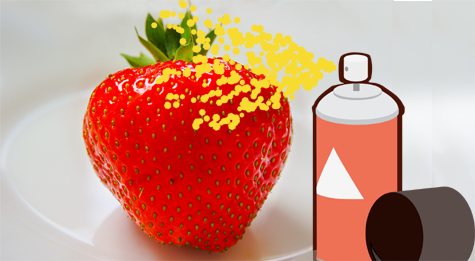What’s On Your Produce – Part II
WHAT’S ON YOUR PRODUCE – PART II ~ ISSUE 211 ~ JUNE 7, 2016
By Diane Gold
GENERAL INFO
 Whether we are parents, teachers, concerned friends; we have to be knowledgeable about what’s on your produce, that is, our produce. In order to be knowledgeable, we have to have knowledge.
Whether we are parents, teachers, concerned friends; we have to be knowledgeable about what’s on your produce, that is, our produce. In order to be knowledgeable, we have to have knowledge.
It is clear that we don’t get the full picture from a very young age on which we can build as we understand more. This is absurd, and only we can change this by mentioning it.
So I am mentioning it. I have previously talked about this subject in
What’s On Your Produce – Part I in Issue 147, September 23, 2014. Here’s Part II.
Let’s consider ethics in the food business, not just that raising animals means killing animals; but that being the nurturer of the soil to produce plant food means not using toxins that will inevitably poison the people who eat the food, the land on which it’s grown and the water that we drink or our waterways that sustain life.
THE FACTS
It is imperative that we talk about these important things and that we discuss these facts with our preschoolers. Here, we focus on what’s on your produce.
1) In order to grow food, we must properly prepare the soil so that predatory bugs and microbes will not come to eat our crop.
2) To end up with great plants that do not have questionably toxic pesticides on them, we have to plan several years ahead to get soil in workable condition so that the wrong bugs don’t come, or we can plan ahead and begin our vertical farms which may require NO SOIL which means NO BUGS.
3) Since we have limited funds, we want to save money up front, not thinking that the cost of pesticides later will equal the cost of preparing the soil up front. It seems more expensive up front, so we don’t prepare the soil. Then, when insects and micro-organisms do appear, we go into debt by spending huge amounts of money on pesticides that may be toxic to our health, rather than fixing our soil at that time.
4) New farmers, whether they be single farmers or agricultural giants, do not learn from the mistakes of their foreparents because no one is teaching it. This keeps the pesticide cycle going and going.
MYTH
Myth: organic produce is pesticide free.
Organic produce is not pesticide free. Its pesticides are made without synthetics. That means, unless we grow it ourselves, it has pesticides on it, except in rare cases. Sadly, I just read a blog article that would seem to have been researched, even though there are only a few references to actual studies. In it, it states that organic produce is pesticide free. With people putting info out there incorrectly, we have to work twice as hard to output what’s correct.
5) Giant pesticide companies can double as seed producers. These companies genetically alter seeds to be used with their pesticides. These GMO seed companies teach us that we need pesticide products to control our crop. Apparently, there are some ground breaking, ethical farmers who have proven this to be untrue.
EDUCATION
Why is it that we are not taught the cycle of soil and seeds and successful growth without pesticides? We need to know about this as children so that we can question the use of pesticides and make changes to the way we produce produce.
There is a favorite website of mine called http://whatsonmyfood.org. It is quite shocking to see that some of the seemingly healthiest crops in the world have tragically high amounts of pesticide on them. Even if this pesticide imbalance continues, shouldn’t we know about this from an early age? Is it ethical that there is a term called,
“pesticide tolerance?”
 Are we lab rats for which assessment must be made that if pesticides on a food rise beyond our tolerance level, we will die? Or should we protect ourselves should we protect our waterways which means, ultimately, our drinking water?
Are we lab rats for which assessment must be made that if pesticides on a food rise beyond our tolerance level, we will die? Or should we protect ourselves should we protect our waterways which means, ultimately, our drinking water?
Wouldn’t a better solution be not to use pesticides but to work together with nature?
ACTION STEPS
1) STUDY how some farmers do not need pesticides.
2) GROW one edible plant in a pot with no fertilizer or GROW one edible plant in the nature of a vertical farm, with no soil.
3) TELL one young person about the fact that pesticides are not clearly discussed early enough in school and have a discussion. Hopefully, the youngster will have had a progressive teacher and be able to teach you some things.
4) MENTION the idea that we don’t learn about pesticides when we are young to your friends.
5) KNOW more about what’s on your produce.
![]()
![]()
If you wish to share your story, leave it as a comment under an article at https://warriorsofweight.com/issues. or even better, write your own article and put it up on a free wordpress site (https://wordpress.com), or post it on a social media site. Share yourself.
If you need habit help, check out warriorsofweight.com/consulting.
Know that you can reach out to a fellow human, probably to the person right next to you. If that interaction works out poorly, do it again. It’s worth it, since most people are nice and want to connect with you.
![]()
FEEDBACK
Please leave a comment below.
Please LIKE us on the website and at
WarriorsOfWeight on Facebook.
You can comment on Twitter @warriorsoweight.
Thanks.
![]()
DIANE GOLD, PUBLISHER AND AUTHOR
Diane Gold, Founder of Warriors of Weight, Turning Habits Into Health, has been a mentor in tai chi, kung fu and meditation, has been a music, fitness and stress expert, dedicated mom, studying peaceful conflict resolution, habit replacement and has been certified in plant-based nutrition.
She believes we deserve to know what’s in and on our food. Thus, Part II of What’s On Your Produce arrives. She says,
“My modus operandi is always to save animals from death by human, my first and foremost reason to be vegan. But that doesn’t include the what’s in it for me scenario. So here it is: eat plants because they are better for the body and mind and eliminate many, if not most, chronic diseases.
“That being said, when we eat our plant food, we must be educated as to what is normal and what is not. It is not enough to think that buying organic plants saves us from pesticides. It does not. Organics use substances that are the same or similar to the chemical products. They are not from person-made substances, but they are similar. And, on produce, in particular, as the Part I, Issue 147 article emphasizes, so much of our produce is coated with a wax-like substance to keep moisture in for travel, including organics (which might be more likely to abuse bees to acquire this substance because they use beeswax coating on most citrus fruits).
“Whatever we think, it is crucial that we teach our children about what’s on your produce, that is, our produce. This is so they can know it’s not normal to choose to eat chemicals, harvested from nature or synthetic, if we can opt to have food that has none, and so they can change it.
“Check out the Vertical Farms article for the perfect way to grow produce with no sprays, chemicals or wax.
“And, in doing so, we get to take overall good care of each other and ourselves – including loving ourselves and our fellow beings at all costs – because we are all always worth it.”
![]()
EXERCISE OF THE WEEK:
GO TO WHATSONMYFOOD.ORG AND LOOK AROUND. CHANGE ONE BUYING HABIT, IF NEEDED, BASED ON WHAT YOU FIND.
![]()







